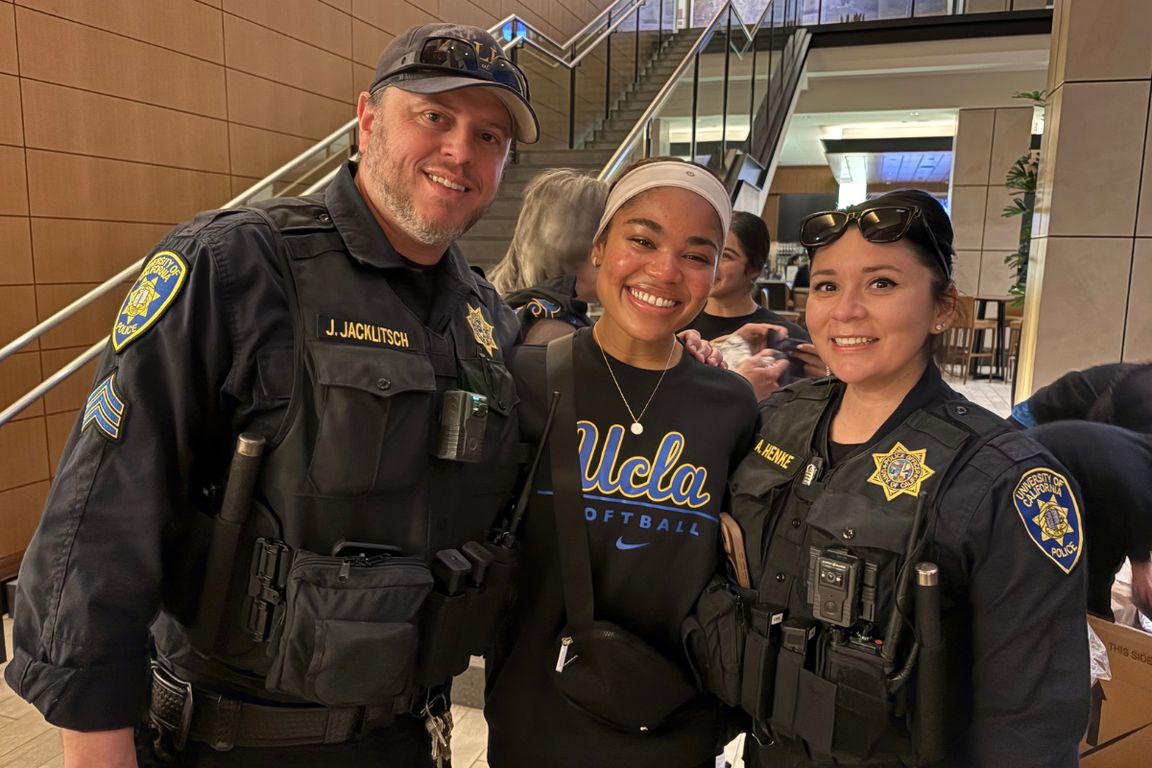
As the January wildfires neared UCLA’s Westwood border and impacted the lives of students, faculty, staff and large parts of Altadena and Pacific Palisades, the Bruin community sprang into action. From donating space at Research Park for the Disaster Recovery Center to staff members working to preserve trees in Altadena, faculty and students in nearly every field, from environmental studies and urban planning to medicine to psychology and biology, have been providing expert analysis, guidance and hands-on assistance.
And the work continues. Trail cameras placed by researchers after the fires show bobcats, coyotes, owls and other animals returning to the Chaney Trail Corridor northwest of Eaton Canyon. Faculty members and students from the UCLA Samueli School of Engineering are developing research aimed at mitigating future wildfire devastation, including soil testing and hazardous waste safety. A new Urban Water Supply + Fire working group has been launched to strengthen water supply infrastructure, resilience and post-fire recovery.
To commemorate Earth Day and Earth Month, Newsroom is taking a look back at the people, places and rebuilding efforts that have aided the region’s recovery in the months following the fires.
How a UCLA engineer is using his lab to do free soil testing for fire-impacted L.A. homeowners
Professor Sanjay Mohanty is testing soil for heavy metals, chemicals and other pollutants to help give residents peace of mind.
UCLA experts are monitoring wildlife recovery in Eaton fire burn area
UCLA researchers are taking part in the effort to monitor plant and wildlife recovery in the Chaney Trail Corridor, located Northwest of Eaton Canyon.
UCLA launches urban water supply and wildfire research network to strengthen disaster preparedness
To address this critical issue, UCLA’s Climate & Wildfire Research Initiative is launching a new Urban Water Supply + Fire working group.
Are We Already Doomed by Climate Change?
Despite the recent fires, Michael Jerrett says we can reverse the current trends of cataclysmic climate change.
Firefighters have a 9% higher risk of a cancer diagnosis and a 14% higher risk of dying from cancer compared with the general population.
Understanding how wildfires affect California’s kelp ecosystems
Studying wildfire-impacted kelp deepened UCLA doctoral student Lori Berberian’s commitment to environmental science.
The global good: How UCLA is working toward a healthier, cleaner and more sustainable planet
For more than 50 years, Bruins have been at the vanguard of research and advocacy aimed at protecting the environment.
UCLA’s LPPI and Luskin host panel on Los Angeles wildfire recovery
Leading voices in politics, media and planning came together to provide an overview of local recovery efforts.
UCLA partners with Urban Land Institute and USC on roadmap for rebuilding after the L.A. fires
The Project Recovery roadmap — a comprehensive plan aimed at helping to guide Los Angeles–area rebuilding efforts in the wake of January’s wildfires — provides actionable recommendations to support a more resilient future.
How UCLA engineers are aiding L.A.’s wildfire recovery and addressing post-fire hazards
From assessing the removal of hazardous waste, toxic soil and debris to using AI in early fire detection, UCLA Samueli faculty and students are in the mix.
Degrees: L.A.’s post-fire rebuilding – Water edition
UCLA water and climate researchers provide comprehensive responses to questions about water for firefighting in urban environments.
Do urban water supply systems put out wildfires?
UCLA experts and colleagues provide answers to frequently asked questions about firefighting, water infrastructure, fire hydrants and more.
Experts will provide L.A. civic leaders with the research-informed knowledge to create policy to inform ‘safe and resilient’ recovery.
One UCLA: How acts of kindness have kept Bruins connected to each other and L.A. amid tragedy
Wildfires carved an unprecedented trail of destruction through the city. The UCLA community has met the moment with generosity, support and a commitment to help Angelenos recover.
‘Community, connectivity and humanity’: Bruins at the disaster recovery center
More than 1,000 UCLA community members have volunteered to help out at the FEMA center at the UCLA Research Park.
UCLA: L.A. wildfires caused as much as $164 billion in total property and capital losses
UCLA Anderson economists Zhiyun Li and William Yu say the fires could also cause a loss of $4.6 billion to Los Angeles County’s GDP.
UCLA Extension director working to save trees that survived Eaton Fire
Stephanie Landregan of UCLA Extension is lending her expertise to recovery efforts in Altadena.
Un estudio de UCLA muestra que las desigualdades sistémicas y las prácticas discriminatorias contribuyeron a la vulnerabilidad y los impactos del fuego.
Altadena’s Black community disproportionately affected by Eaton Fire, report shows
UUCLA study shows systemic inequalities and redlining practices contributed to fire vulnerability and impacts.
After the fires: UCLA urban planner on disaster response and rebuilding
UCLA urban planning and disaster response expert Stephen Commins answers some of the most pressing questions.
L.A. fires: Vegetation 25% drier due to climate change
UCLA climate scientists’ analysis links climate change to about a quarter of the extreme vegetation dryness when the Palisades and Eaton fires began.
Los incendios forestales tienen un gran impacto en las comunidades latinas
Los datos muestran que los trabajadores latinos están más expuestos a sufrir enfermedades respiratorias y a perder ingresos durante los incendios.
Wildfires disproportionately impact Latino and other underserved L.A. communities, data shows
Data shows Latino workers are more often at risk of respiratory illness and income loss during fires.
This story was originally published by the University of California, Los Angeles.